2025: Blue Humanities and Liquid Media: A Watery View of the World
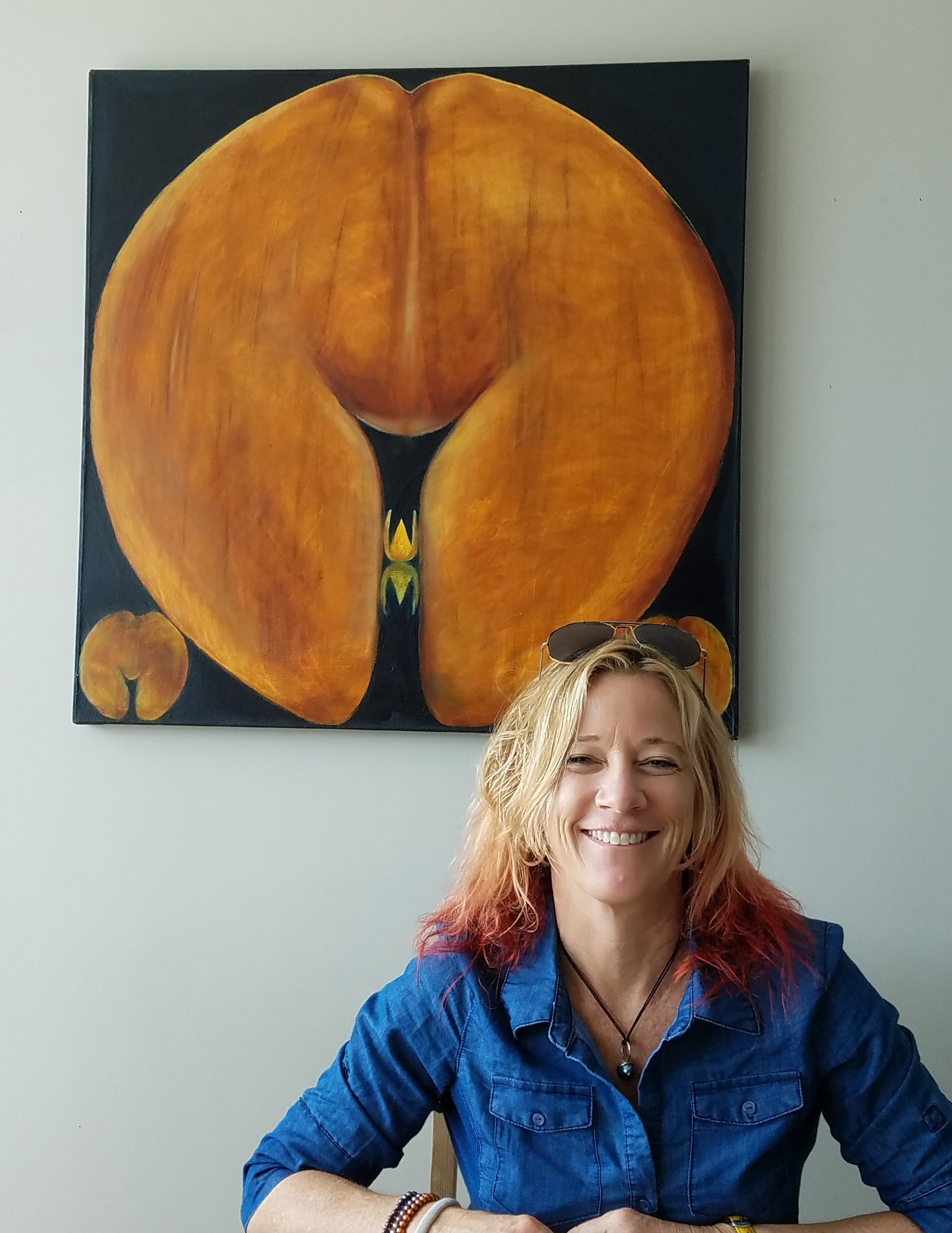
2024: Forging Collectivity: Belonging, Collaboration, and its Disconnects
Considering the expansiveness and complexity of conceptions of collectivity alongside the co-existence of its dispossessions in global contexts of colonialism and structural and systemic violence, this conference brings together papers that research collectivity and its shifting identities, representations, political, social, and class affiliations, and affects.
Collectivity—be it social or spatial—can be fluid and even conditional, and often is not bound to single- form representations or spaces. This can be seen in various participatory social projects uniting communities across geographies through shared experiences. This is apparent, for example, in the rise of transnational feminist collaborative art spaces throughout the 1970s, where the creation of socially engaged art programs, spaces, magazines, and feminist archives became new sites of solidarity. Another example can be found in commemorative objects like the NAMES Project AIDS Memorial Quilt, which displays collectivity while evolving in form through time and space. Beginning in 1987, the quilt continues to grow as individuals contribute to it today in communal grief and memorial of lives lost to AIDS.
With these ideas in mind, this conference poses the following questions: How is collectivity imagined, built, and sustained in art, literature, performance, and film? What conditions are placed on the collective, and to what extent is individual participation negotiated? How does resistance manifest itself collectively when the site of community is dispersed, or disconnected from its roots? Alternatively, how can individuals resist being drawn into social identifications that no longer serve them?
Keynote Speaker: Dr. Meryem Kamil (UC Irvine)

2023: Landscape and Garden in Art, Literature, and Film
As conversations around landscape and nature have become central topics in global discussions in film, art, and literature studies–at a time of ecological reckoning and social reframing–the UCSB Graduate Center for Literary Research (GCLR) invites emergent and established scholars from a variety of disciplines to come together for a one-day conference.
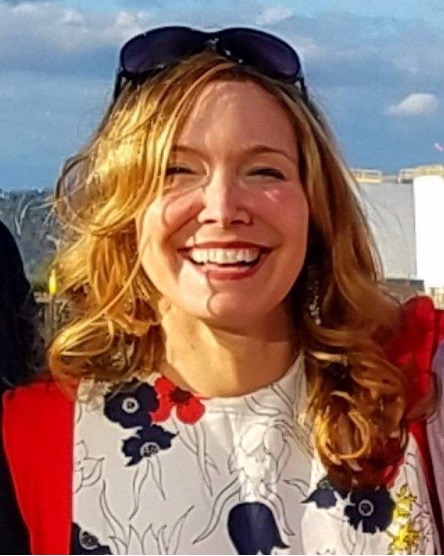
2022: Forked Tongues: The Role of (Foreign) Languages in Literature, Film, and the Arts
2020: Climate Fictions
2019: Memory & Movement
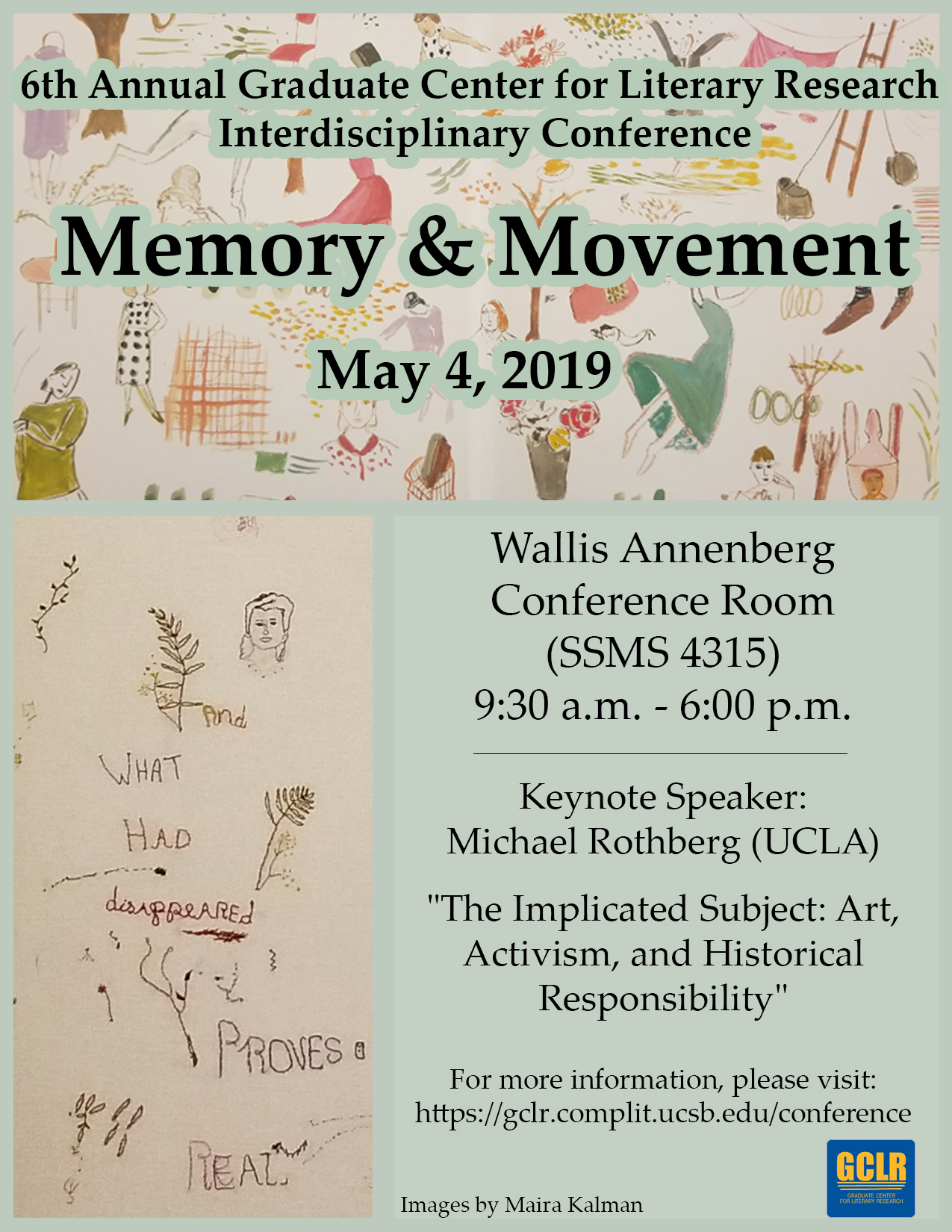
The study of memory has developed dynamically, transculturally, transnationally, and through ongoing scientific and sociohistorical discoveries and changes. In collaboration with the Memory Studies Reading Group, the sixth annual GCLR conference examined the interplay between memory and movement through a wide range of perspectives and disciplines. Presentation topics included the effects of neuroscientific discoveries and digital discourse on our understanding of individual and collective identity, the role of literature and art in thinking through trauma and transgenerational memories, the role of narrative in the possibility for healing after disaster, and the power of memories held within buildings, structures, and cities. The wide range of presentations that guided our conference's conversations showcased the immense significance, scope, and implications of the field of memory studies both across disciplines and at this particular moment in our world.
Keynote:
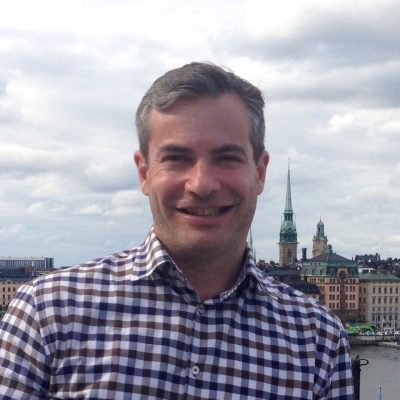
Michael Rothberg is the 1939 Society Samuel Goetz Chair in Holocaust Studies and Professor of English and Comparative Literature at the University of California, Los Angeles. He is the author of The Implicated Subject: Beyond Victims and Perpetrators (2019), Multidirectional Memory: Remembering the Holocaust in the Age of Decolonization (2009), and Traumatic Realism: The Demands of Holocaust Representation (2000). With Yasemin Yildiz, he is currently completing Inheritance Trouble: Migrant Archives of Holocaust Remembrance. Rothberg’s keynote address argued that the familiar categories of victim, perpetrator, and bystander do not adequately account for our connection to injustices past and present and offered a new theory of historical responsibility through the figure of the implicated subject. Implicated subjects occupy positions aligned with power and privilege without being themselves direct agents of harm; they contribute to, inhabit, inherit, or benefit from regimes of domination but do not originate or control such regimes. With examples from different national contexts, including South Africa and the United States, and from different social realms, including art and activism, the lecture illustrated how the position of the implicated subject can offer a lens for addressing different scales and temporalities of injustice, but can also provide a lever for rethinking resistance and solidarity across social location.


2018: Borderlines
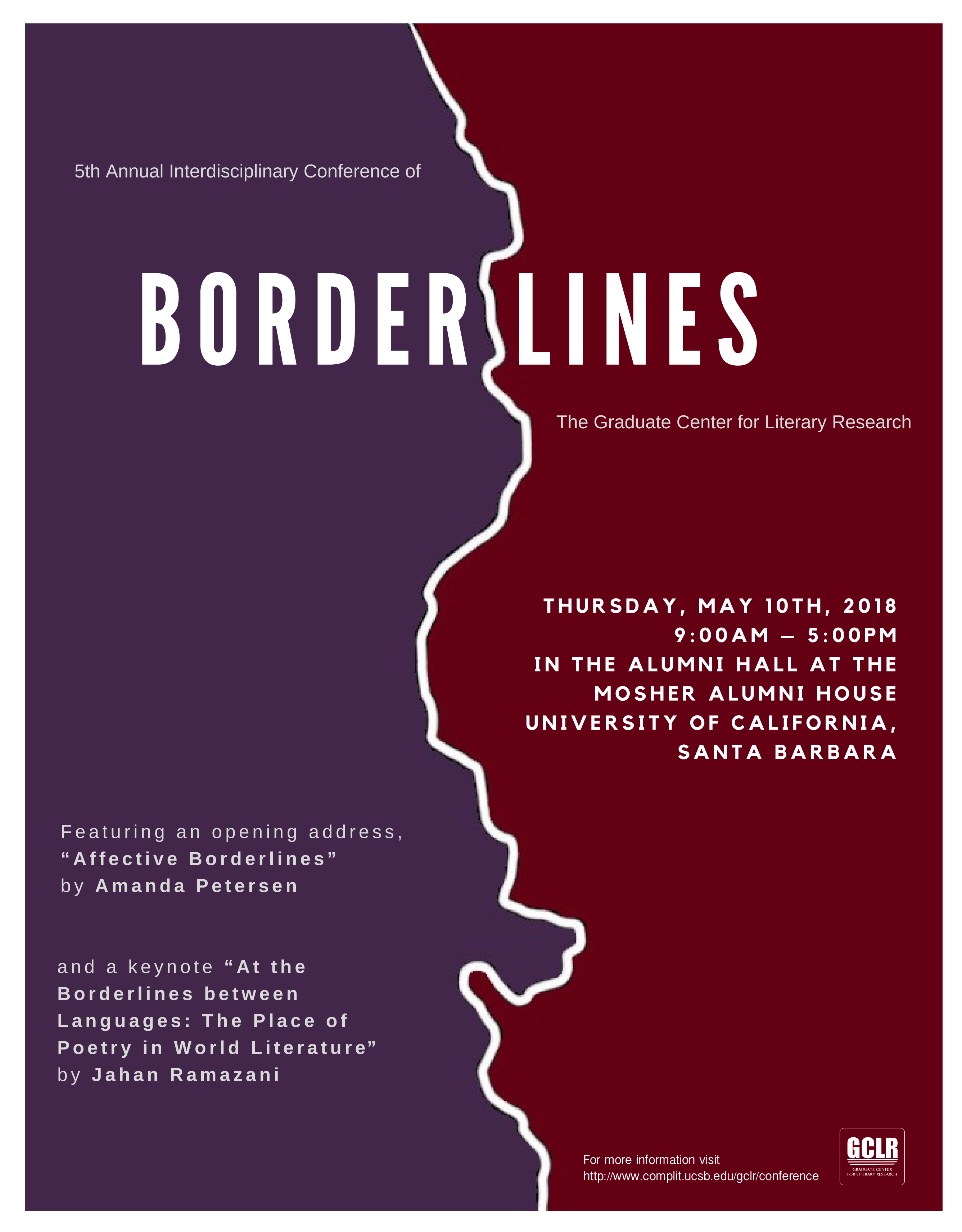
In an era when civil wars, breakaway movements, economic upheavals, nationalist politics, and isolationist policies are at once thickening, erasing, and redrawing the lines that divide us physically and figuratively from one another, a unique opportunity arises for scholars to investigate critically what these lines mean for world communities and individual lives. The Graduate Center for Literary Research at UC Santa Barbara provided a forum for this scholarly inquiry at its 5th annual conference, Borderlines, gathering a variegated range of critical voices on the questions raised by the borders, real and imagined, that divide us. How do we overcome labels and defy categories? How do we bridge linguistic, cultural, and ethical divides? What does it mean to cross the threshold, transgress the boundary, hop the border, to deport or import, or to at once immigrate and emigrate? In short, what does it mean to cross the line?
Introductory Speaker:
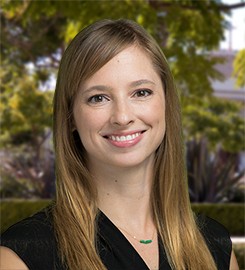
Amanda L. Petersen (PhD University of Colorado at Boulder) is an Associate Professor of Spanish at the University of San Diego and is affiliated faculty with the Latin American Studies and Gender and Women Studies Programs. A specialist in Latin American women authors, her research interests center on the difficulty of representing issues of gender and violence, in particular in contemporary Mexican short narratives by women authors. Her lines of investigation include spectrality, gender, visual culture, and border studies. Petersen is the co-editor of Espectros: Ghostly Hauntings in Contemporary Transhispanic Narratives and a forthcoming volume on Mexican author María Luisa Puga.
Keynote:
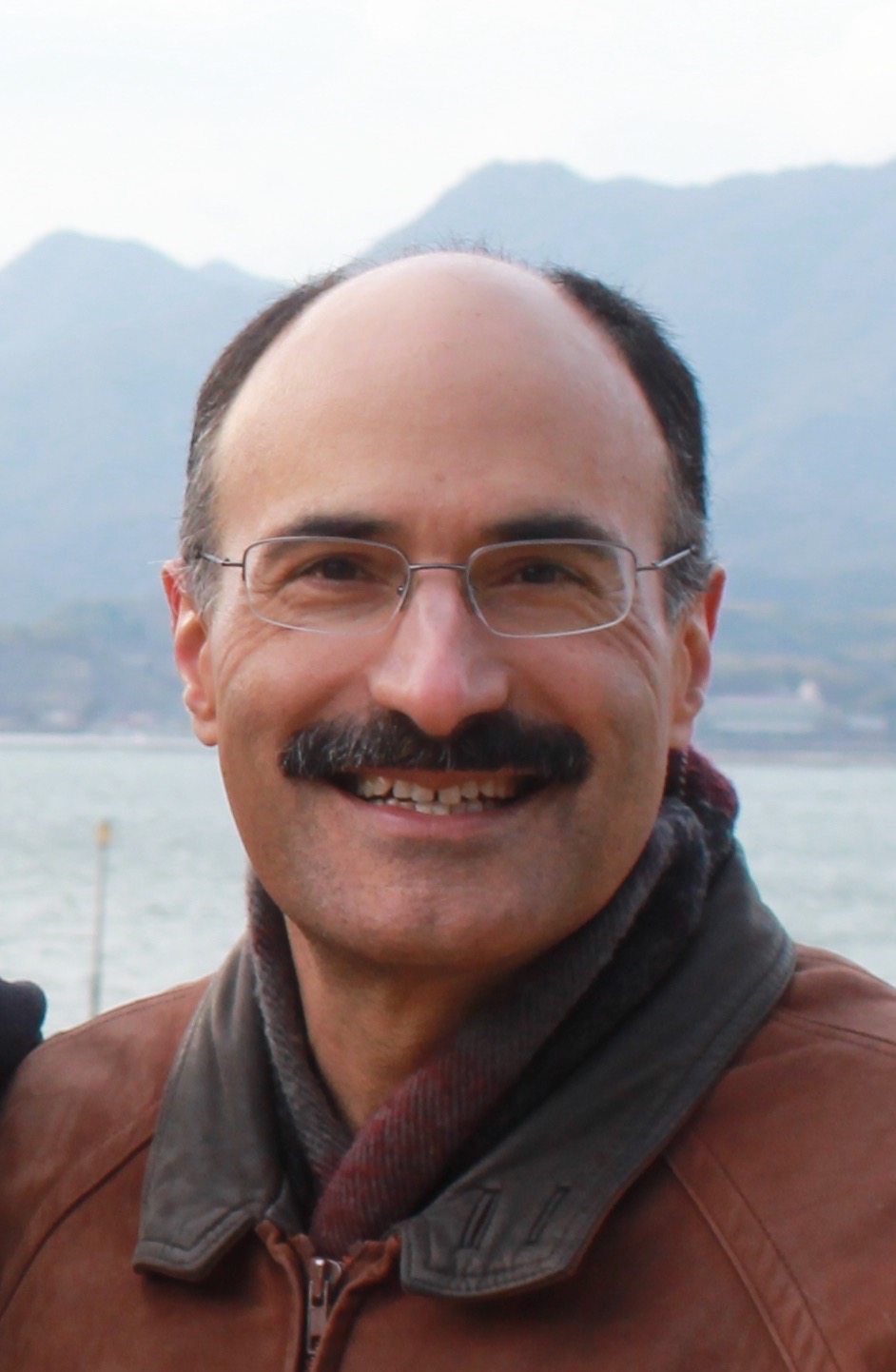
Jahan Ramazani is University Professor and Edgar F. Shannon Professor of English at the University of Virginia. He is writing a book on poetry in a global age. His five previous books are Poetry and Its Others: News, Prayer, Song, and the Dialogue of Genres (2013); A Transnational Poetics (2009), winner of the 2011 Harry Levin Prize of the American Comparative Literature Association, awarded for the best book in comparative literary history from 2008 to 2010; The Hybrid Muse: Postcolonial Poetry in English (2001); Poetry of Mourning: The Modern Elegy from Hardy to Heaney (1994), a finalist for the National Book Critics Circle Award; and Yeats and the Poetry of Death: Elegy, Self-Elegy, and the Sublime (1990). He is editor of The Cambridge Companion to Postcolonial Poetry (2017); a co-editor of The Norton Anthology of Modern and Contemporary Poetry (2003) and The Norton Anthology of English Literature (2006, 2012, 2018); and an associate editor of The Princeton Encyclopedia of Poetry and Poetics (2012). He is a recipient of a Guggenheim Fellowship, an NEH Fellowship, a Rhodes Scholarship, the William Riley Parker Prize of the MLA, and the Thomas Jefferson Award, the University of Virginia’s highest honor. In 2016, he was elected to the American Academy of Arts and Sciences.

2017: Resonance
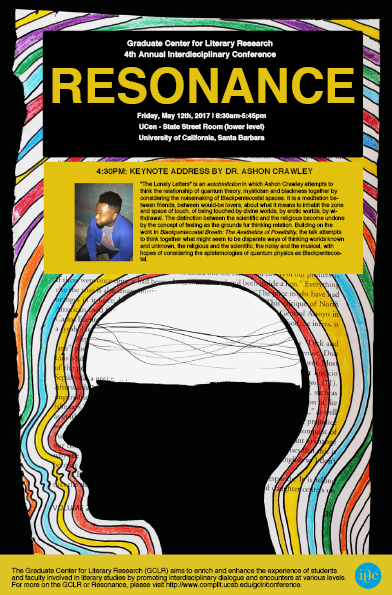
In a year when the Nobel Committee has invited a critical reexamination of a border between the sonic and the textual by awarding the Nobel Prize in Literature to Bob Dylan, UC Santa Barbara’s Graduate Center for Literary Research held its fourth annual interdisciplinary conference: Resonance. Resonance explores configurations of the graphic, phonic, textual and sonic, among and between cultures, literatures, languages, media, musics, and inter(subjects). How can resonance guide our inquiry into the dynamics between texts, stages, performers, artists, spaces, and audiences? How do bodies and materials generate and mediate resonance? How might we engage with resonance “to replace the binaries of structuralist thought with [a discourse] diametrically opposed to a distancing and objectifying form of knowledge”? (Veit Erlmann, Keywords in Sound).
Keynote:
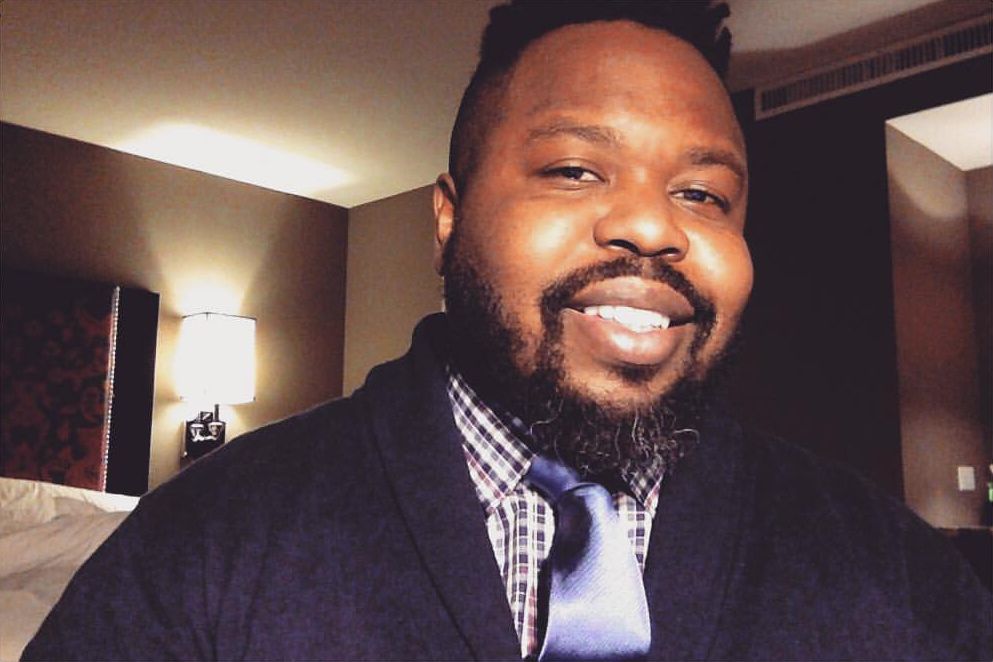
Ashon Crawley will be joining the faculty of UVA in the fall of 2017 and was previously Assistant Professor in the Department of Ethnic Studies at UC-Riverside. Dr. Crawley earned his PhD in English from Duke Univeristy. His 2016 book Blackpentecostal Breath: The Aesthetics of Possibility “engages a wide range of critical paradigms from black studies, queer theory, and sounds studies to theology, continental philosophy, and performance studies to theorize the ways in which alternative or ‘otherwise’ models of existence can serve as disruptions against the marginalization of and violence against minoritarian lifeworlds and possibilities for flourishing.” For more on Dr. Crawley, please visit his website: ashoncrawley.com.

2016: Migrations
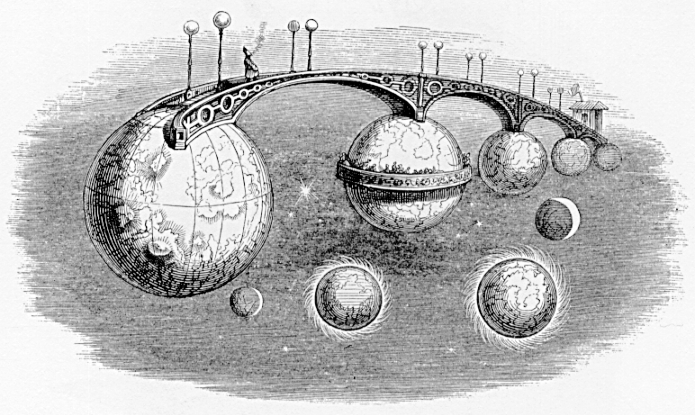
Our third annual graduate conference seeks to explore the topics of translation, memory and exchange within the context of migration. We are interested in how questions of cultural transfer and linguistic translation—using translation in an expansive sense of the term—inflect textual and media representations of migration. Papers analyze the translative practice of migrant writers, artists, filmmakers and intellectuals as they navigate the increasingly ephemeral and shifting spheres of co-existence in the age of globalization. How does translation serve to mediate space, belonging and intersubjectivity in literature, film and art? How can we expand the fields of translation and literary studies to encompass these urgent questions of movement and migration?
Keynote:
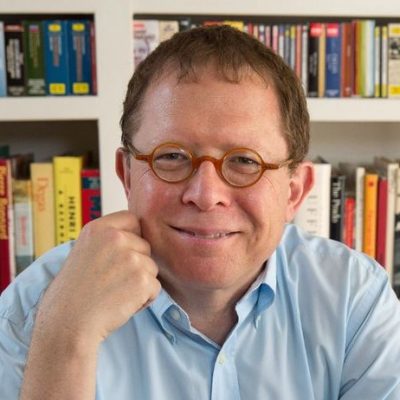
Efraín Kristal, Chair of Comparative Literature and Professor of Spanish and French at UC Los Angeles, delivered the keynote address on philosopher and cultural theorist Peter Sloterdijk’s engagement with narrative via his seminal notion of the sphere. Sloterdijk’s expansive and open-ended work highlights the shift from the fiction of a unified sphere to a plurality of contemporary, cross-cultural spheres—spaces that Kristal analyzes in relation to their varying degrees of continuity and discontinuity. In light of increased migration in globalized situations, the complexity of these heterogeneous spheres demands our attention as scholars, in order to address dilemmas and challenges of our moment.

2015: Cut 'n' Mixed

The term “Cut ‘n’ Mixed” summons the image of a sound engineer mixing at an editing desk, or a DJ juggling samples together at a turntable or even the creative insurgent who scavenges the resources of culture to produce new forms that challenge and resist. “Cut ‘n’ Mixed” displaces conceptions of cultural production that affirm originality and authenticity, valorizing instead the remix, sampling, multiple versionings and other forms of rewriting. The broader theoretical implications of an aesthetics of turntablism, with its rhizomatic roots in the Jamaican sound system and U.S. urban culture, demand engagement. Issues of cultural hybridity, intellectual property, culture jamming, the politics of reappropriating found objects and the aesthetic and social implications of electronic dance music and hip hop all converge in the coordinates of “Cut ‘n’ Mixed.” “Cut ‘n’ Mixed” successfully made connections between this paradigm and literary research; the conference remained interested in the ways cuts, breaks, mixes and improvisation can be incorporated in performances. Both traditional academic presentations and presentations that had a performative component were included.
Keynote:
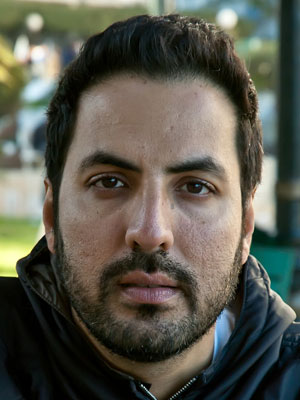
Sohail Daulatzai is UC Irvine associate professor in Film and Media Studies and African American Studies and author of Black Star, Crescent Moon: The Muslim International and Black Freedom Beyond America (2012), which maps the rich, shared history between Black Muslims, Black radicals, and the Muslim Third World, showing how Black artists and activists imagined themselves not as national minorities but as part of a global majority, connected to larger communities of resistance.
2014: Disclosure

The first annual GCLR conference centered upon the theme "Disclosure." While disclosure is often defined in terms of divulging information and sharing secrets, it also evokes hidden, withheld, or disavowed knowledge(s). Disclosure can serve as a destabilizing act or influence in a range of contexts, from sharing “forbidden” information on the internet (à la Wikileaks) to confiding difficult truths to a caregiver. As disclosures erupt into existing discourses, narratives, and epistemological landscapes, alternative topographies emerge: ideas about what can be known, what may be hidden, and what must be shared become mutable. Disclosure therefore suggests transformation; it prompts a (re)evaluation of the multiple contexts and positionalities that give shape to the ways we understand our worlds.
Keynote:
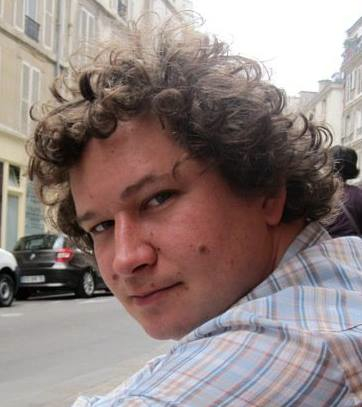
Glyn Salton-Cox, who gave the keynote address "Frank Comrades: Foucault’s Courage of Truth and Midcentury Leftist Culture," is Assistant Professor of English and an Affiliate of Feminist Studies at the University of California, Santa Barbara. He is the author of Queer Communism and the Ministry of Love: Sexual Revolution in British Writing of the 1930s, and he is currently working on a monograph on the cultural, literary, and intellectual history of the lumpenproletariat.

